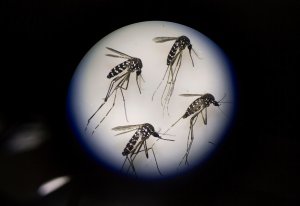Officials on Thursday confirmed the first case of sexually transmitted Zika virus in Los Angeles county.

A “male resident” developed symptoms of the Zika infection in early November after apparently traveling to Mexico.
His “female partner,” who did not travel, then developed symptoms after her partner returned from his trip.
The Zika virus can also be transmitted by a mosquito bite, and Los Angeles County has seen 122 cases of Zika infection through a infected mosquito since 2015. All but one of those cases stemmed from an infected mosquito during travel to areas where Zika is occurring, officials clarified.
Vector control agencies regularly test mosquitos that may carry the virus in L.A. County, public health officials said in a news release Thursday.
“This case is a reminder to take precautions during sex or avoid sex if you or your partner have traveled to an area with risk of Zika,” Jeffrey Gunzenhauser, interim health officer for Los Angeles County, said in a news release.
The sexual transmission of the virus can often occur without symptoms, Gunzenhauser added.
“Given the risk for birth defects, the greatest concern is transmission of the virus to women who are pregnant or attempting to become pregnant,” he said.
Officials recommend that couples use condoms or abstain from sex for six months after a male partner has been exposed or diagnosed with Zika and eight weeks after a female partner has been exposed or diagnosed to prevent the transmission.
Zika remains prevalent in Mexico, Latin America and other regions, officials said.
Travelers are advised to take precautions against the virus while traveling by avoiding getting mosquito bites. Using Environmental Protection Agency-approved mosquito repellent, wearing long sleeves and pants are recommended.
Symptoms for the virus include fever, joint pain, rash, red eyes and muscle pain three to seven days after being infected.
Those who are infected are rarely hospitalized or die from this disease, officials said.





















